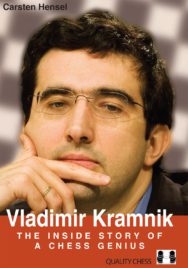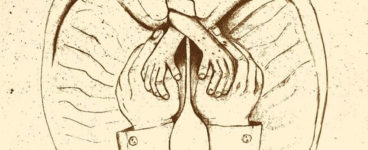‘Vladimir’s style is linked to enjoying the game. He likes to play beautiful chess.’
Sports biographies fill many a stocking on Christmas day, and the fine people at Quality Chess have just released one that all budding Grandmasters will cherish. Here at BooksfromScotland, we have a little taster.
Extract taken from Vladimir Kramnik: The Inside Story of a Chess Genuis
By Carsten Hensel
Published by Quality Chess
Much has been written about Vladimir Kramnik. What I can add is an authentic first-hand impression of this extraordinary man and the most important events in his great career. Nobody else was as close to the great matches of the 14th World Chess Champion over such a long period of time. Our friendship began back in the 1990s and stays strong. And in the intense period from 2002 to 2009, I was his professional advisor.
During specific phases of his career, certain circles have tried to portray Kramnik as a boring, self-centred pragmatist. Even Garry Kasparov, his predecessor on the chess throne, joined in this criticism for a while. But those presenting such an image of Kramnik have either no idea of who or what they are talking about, or simply wished to create this image out of self-interest.
Kramnik, a positionally active and very creative player, has played some of the most beautiful games in chess history. And the way he plays chess is how he conducts himself away from the board: sometimes chaotic, sometimes emotional, sometimes brilliant – but consistently authentic. Few, if any, have enriched the development of this magnificent game as much as Vladimir.
We are setting out on a journey through four decades of the life of the 14th World Chess Champion. On the way we will experience many emotional moments and come into contact with the dark side of the chess world.
In 1992 Garry Kasparov won the super-tournament “Dortmund Chess Days”, nowadays known as the Sparkassen Chess Meeting. On the floor below, in the public bar of the Westfalenhalle, 17-year old Vladimir Kramnik shared first in the accompanying Dortmund Open. He achieved this in great style, ahead of another 541 participants, including more than 100 international title holders. This success drew the attention of the chess media to the young Russian for the first time. Garry Kasparov said: “The most talented of all the players here is Vladimir Kramnik. All the others are making moves, but Kramnik is playing chess!”
I had heard of Kramnik the year before, picked up in passing in conversation with the ex-world champion (1948-1963) Mikhail Botvinnik, but it was only at this moment I really paid attention. Vladimir and I got to know each other better and better during the 1990s. After the Dortmund tournament of 1992, Kramnik received invitations to all the top events. He quickly climbed into the top 10 of the world ranking list, a place he would not relinquish until November 2014 (at the time of printing, October 2018, Kramnik is ranked 7th).
In 1993, Kramnik was invited to the top group in Dortmund, a tournament which he won for the first time in 1995 and would go on to win a further nine times in his “Dortmund living room”. His ten victories in such a high-level international competition represent a special record in the history of sport.
In the account which follows it is Vladimir Kramnik the man who is to be portrayed, while at the same time priority will be given to what happened during his time as World Chess Champion. It is the first biography to be published since he won the world championship title in a match in 2000 against Garry Kasparov.
Vladimir has contributed to this book quite considerably. My work was made easier by notes I had made during his great matches. Once years have passed, we tend to see things through a particular lens. For that reason, I have tried to present Kramnik’s and my views from as close as possible to what was happening at the time. I was helped in this by a dozen folders of material, notes in my weekly planners, as well as interviews and comments made by Kramnik at the time.
At the end of each chapter Vladimir Kramnik himself reviews the most important games played at these key moments in his career. These annotations are not the usual deep analysis of possible variations we see in magazines and tournament chess; rather they describe what the 14th World Champion was feeling at these peaks of his career.
At the end of the book there is a detailed historical record. This includes, amongst others, all Kramnik’s world championship games played between 2000 and 2008. There is also information about all previous world champions in the history of classical chess, based to a great extent on the opinions of Vladimir.
It would be a great satisfaction to Vladimir Kramnik and me if this book ignites in any reader of this book an interest in the most splendid of all games, chess. I hope you will read on and patiently study many wonderful games by the 14th World Chess Champion with a smile on your face.
Carsten Hensel
Dortmund, October 2018
Vladimir’s style is linked to enjoying the game. He likes to play beautiful chess. For him beauty comes to life more in the depth of the process and less in some extraordinary event: “As a child I would have liked to become a painter and later I integrated this desire into my play. I like to be creative. In this way I can penetrate more deeply than usual into the subtleties of a position.”
The public is another important factor for Kramnik. When hundreds of people stream into the playing hall and millions of chess fans follow his games on the internet, that is a great source of satisfaction. However, not all chess lovers can see all the nuances of the game. When we talk about depth and understanding, the analysis provided by a chess engine is often of little help. Kramnik does not find this so tragic: “The more people there are at a concert by a musician, the more intense the effect the performance will be on each individual. Whenever I am at a concert, I know that I can only reach a certain depth in my listening to the music. But feeling that perfection is to be found at a greater depth than my subjective experience has always fascinated me.”
Vladimir Kramnik’s favourite colour is blue, and he is particularly fond of desserts. He likes double espressos, from time to time a good glass of red wine, and also after particularly great efforts sometimes a small glass of single malt Scotch whisky. He can no longer tolerate much alcohol since in 2005 he was diagnosed with a rheumatic illness, which is chronic and demands almost total abstinence.
Kramnik is a lover of literature. His favourite works include Siddharta by Hermann Hesse, whose work he has discovered in recent years, The Master and Margarita by Mikhail Bulgakov, Animal Farm by George Orwell, and Generation P by Viktor Pelevin. He likes the movies directed by Stanley Kubrick and Miloš Forman, although in general he prefers reading. His favourite actors are Robert De Niro and Inna Churikova.
His musical interests are universal, though he is turning more and more to classical music. His favourite composer is Johann Sebastian Bach. Vladimir is good friends with several virtuosi, including Vadim Repin, about whom Yehudi Menuhin once said: “He is simply the best and most perfect violinist that I have ever had the privilege of listening to.” In painting he feels an affinity to impressionism and loves the works of the Italian painter Amedeo Clemente Modigliani.
Karpov’s Best Games was the chess book which had the greatest influence on him as a child. For one simple reason: in the Soviet Union it was for a long time the only chess book which was available to him. As for his favourite players, he names them in chronological order: Emanuel Lasker, Alexander Alekhine, Bobby Fischer and Garry Kasparov.
What Kramnik considers as the most important character trait in a person is integrity. Vladimir Kramnik is married to Marie-Laure Kramnik, née Germon. He got to know the former journalist at the major Paris newspaper Le Figaro during an interview in 2003. Marie-Laure and Vladimir married in 2007 in the Russian Orthodox church in Paris and are proud parents of two children: Daria and Vadim. The family lives in Geneva, Switzerland.
Vladimir Kramnik: The Inside Story of a Chess Genuis by Carsten Hensel is published by Quality Chess, priced £22.50
Another Christmas recommendation: My Name’5 Doddie: The Autobiography by Doddie Weir, published by Black and White Publishing, priced £20.00
ALSO IN THIS ISSUE

 Drinks for Christmas? 101 Champagnes!
Drinks for Christmas? 101 Champagnes!
‘The UK is historically one of the largest markets for champagne and sparkling wine in the world. W …















